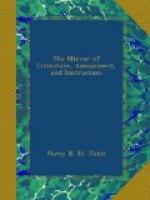Shepherd. Tuts, man! What ails ye at Allbums?
North. No age is free from the infection. We go to a house in the country where there are three unmarried daughters, two aunts, and a grandmother. Complain not of a lack of employment on a rainy morning, in such a domicile and establishment as this. You may depend upon it, that the first patter of rain upon the window is the signal for all the vellum and morocco bound scrap-books to make a simultaneous rush upon the table. Forth comes the grandmother, and pushes an old dingy-coloured volume into your hands, and pointing out a spare leaf, between a recipe for curing corns, and a mixture for the hooping-cough, she begs you to fill it up—with any thing you please.
Shepherd. Weel, weel, man—why canna you oblege the auld body?
North. What right has an old woman, with silver spectacles on her long, thin nose, to enlist any man among the awkward squad which compose her muster roll? Who can derive inspiration from the boney hand, which is coaxingly laid on your shoulder, and trembles, not from agitation or love, but merely from the last attack of the rheumatism?
Shepherd. But young leddies hae their Allbums, too, as weel’s auld anes.
North. And even the young ladies, James, presume too much upon their power. Is there no way of getting into their books, but by writing in their albums? Are we to pay for smiles at the rate of so many lines a dimple? If the fair creatures are anxious to shew they can read, let them discover it by the tenor of their conversation, and not by large folios of quotations from books which every body knows; or if they are anxious to shew that they can write, we can tell them they are very wrong in having any such wish. I will put it to any man—are not the pleasantest women of his acquaintance, those to whose handwriting he is the greatest stranger? Did they not think their adored enslaver, who at one time was considered, when they were musing on her charms, beneath some giant tree, within the forest shade, “too fair to worship, too divine to love,”—did they not think her a little less divine, without being a bit more loveable, when they pored over, in her autograph, a long and foolish extract from some dunderhead’s poems, with the points all wrong placed, and many of the words misspelt?
Shepherd. Neither points nor spellin’s o’ the smallest consequence in a copy o’ verses.
North. Think of the famous lovers of antiquity, James. Do you think Thisbe kept a scrap-book, or that Pyramus slipped “Lines on Thisbe’s Cat” through the celebrated hole-in-the-wall? No such thing. If he had, there would have been as little poetry in his love as in his verses. No man could have had the insolence, not even a Cockney poetaster, to kill himself for love, after having scribbled namby-pambys in a pale-blue, gilt-edged album.
Shepherd. Faith—that’s rather a lauchable idea.




